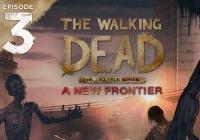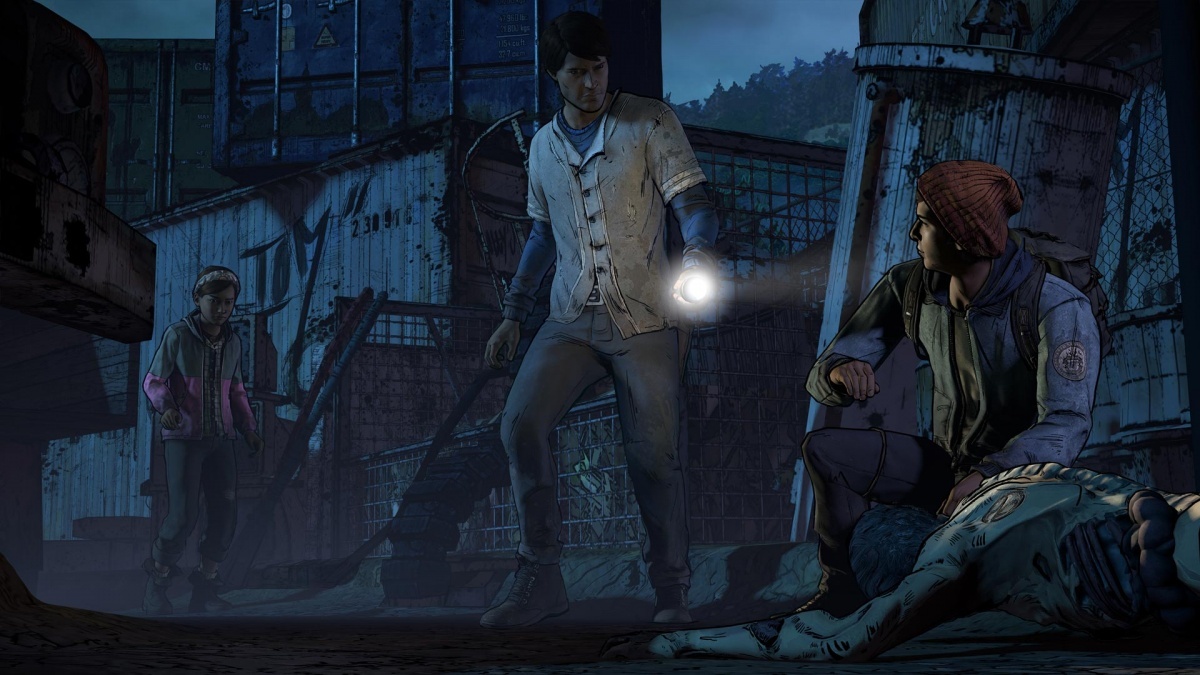The Walking Dead: A New Frontier - Episode 3: Above the Law (PC) Review
By Renan Fontes  03.06.2017
03.06.2017

In a way, episode three of The Walking Dead: A New Frontier is the first real tell of what the season is trying to achieve. Episodes one and two were effectively an opener split in two, so it's up to Above the Law to show what exactly was a narrative misstep and what was deliberate from those two episodes. More than anything, and because of the opener's disjointed nature, episode three has to balance being the real second episode of the season and the third instalment of a five-part narrative.
Like episode one and two before it, Above the Law opens with a flashback that details Javi's life before the events of A New Frontier.
While previous flashbacks were primarily used to develop Javi's connection with his family without dedicating an entire arc to it, episode three's flashback sets up the group's relationship with David, who takes on a bigger role this episode.
Kate is ambivalent towards her husband, Gabe wants to wait for his father for as long as possible, and Javi's feelings towards David are mostly conflicted despite being up to the player.
Even Clem's flashback is more about her relationship with David than answering what happened to AJ in between seasons.
A huge chunk of the episode is spent with David, as well, for better or worse. Better because the plot starts to move towards its endgame, finally introducing the New Frontier and forcing Javi to question who he believes his family truly is, and worse because Above the Law has to sacrifice time that could be spent on gameplay for more story.
It makes sense that a story driven franchise would trade gameplay for plot if it needed to. With only five episodes a season and two spent on an introduction, A New Frontier isn't exactly swimming in the time it needs to tell its story.

The problem lies in episode three once again relying on the illusion of choice instead of allowing actual player agency. This time, more than ever, it's obvious that Javi's dialogue prompts won't amount. A few certainly will, but The New Frontier is telling a very specific story and it's going to make sure things aren't straying off course.
The first half of the episode sets up the idea of Javi needing to impress Richmond's leaders in order to coexist with the New Frontier, but the concept is dropped almost immediately in favour of developing tensions with and surrounding David.
The second half sees some action, but it lacks any real tension, as it's yet another predetermined set-piece that every character has to survive.
Despite the illusion of choice and general linearity, A New Frontier tries to make Javi's decisions interesting, to its credit. Occasionally, Javi's choices will branch into different paths, adding a new layer to decision making. It might not change the overall story, but it is a breath of fresh air.
Above the Law also manages to connect Javi and Clem better than episodes one and two thanks to their relationships with David and the New Frontier, tightening up the narrative as it enters its endgame.
More than anything, episode three feels like set up. As a part of an overarching storyline, that's not too much of a problem, as there are plenty of enjoyable moments in Above the Law. As its own standalone episode, however, Telltale should be trying to be a bit more conscientious when it comes to balancing story and gameplay.

Cubed3 Rating
Good
In its rush to amp up the drama, A New Frontier forgets to offer gameplay to compliment the story. Javi and Clem are balanced quite well now that they have a common enemy through Richmond, but most of the episode is spent taking a backseat to the plot. The first half is almost entirely on-rails, with the occasional dialogue choice acting as the only source of interaction, while the second half tries to add more in the way of combat through quicktime events. The Walking Dead has been a story driven franchise since season one, but it's always tried to balance cutscenes with puzzles and action until now. At the very least, the growing relationship between the two protagonists and Telltale's emphasis on moving the story forward set up a strong, if a bit plot heavy, fourth episode.
Comments
Comments are currently disabled

 Sign In
Sign In Game Details
Game Details
 Out now
Out now  Out now
Out now  None
None  Out now
Out now  Subscribe to this topic
Subscribe to this topic Features
Features






 Top
Top

